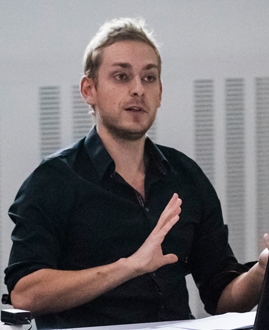Penser l’interconnexion : Le post-humanisme utopique de Björk
Tuesday, Feb 21, 2023
12:00 p.m. - 13:00 p.m.
Online
In 2014, philosopher Timothy Morton and singer Björk maintained and then published an email exchange that highlights the affinities between their conceptions. Indeed, the perspective deployed by Björk throughout her albums feeds analogies with Morton’s ecological thought, which consists in approaching the world in terms of interconnection, not only of human beings among themselves but also of everything that is, living or not, animate or inanimate.
Thus, the rhizomatic work Biophilia (2011) highlights the mesh from the microscopic to the macroscopic (from the chromosome to the universe) around the union of nature, music and technology. Björk then reveals the inscription of the human in her ecosystem by blurring the hierarchical system resulting from humanism. In doing so, she aims to reconnect with our deep humanity, since she describes the album as “folk music of our time”. This perspective stemming from a kind of neo-paganism through the use of modern technologies (Biophilia is the first app-album in the history of music) echoes the history of her country – Iceland – combining roots of persistent traditional spiritual conceptions and the most advanced modernity.
Guided by the transformative virtues of music conceived as a mediator in the service of an ontological revolution, Björk operates a temporal synthesis by referring to both a pre-civilizational state (without religion, without state, without class...) and formulates the futuristic utopia of a post-human tribe achieving unity both within itself and with its ecosystem, and realizing this ideal through a common sound.
Benjamin Lassauzet

Benjamin Lassauzet is a doctor in musicology, associate professor at the University of Clermont-Auvergne, researcher at CHEC (Centre d’Histoire « Espaces et Cultures ») and member of CREAA (Centre for Research and Experimentation on the Artistic Act). After devoting his work to the music of Debussy, particularly on humour (L’Humour de Claude Debussy, Hermann, Paris, 2019, « Coup de Coeur » of the Prix France Musique des Muses 2020) he turned towards Icelandic contemporary music, devoting several communications to them and preparing a book devoted to Björk. His article « About identity. Analysis of Björk’s Modern Icelandic Pop Music » (Musurgia, XXVII/3, 2020) received the 2020 Jean-Jacques Nattiez Prize.

